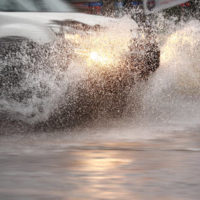Driving In The Rain

It rains in Florida – a lot – but life must go on. People continue to drive, to go out, to do the same things they do in pleasant weather. But when it rains, the roads can become more and more dangerous, potentially leading to accidents and injuries. If you are injured during a rainstorm, the method by which you can potentially seek compensation may be slightly different than it would be in nicer weather.
What Drivers Can Do
Sometimes, an auto accident may simply happen, with there being little that one can do to prevent it. Sometimes, though, there are things a driver can do in a rainstorm to minimize their risk, and most of the time they should do these things to help eliminate any accusations of contributory negligence if an accident does happen. For example, Florida law states that drivers should turn on their headlamps during “any rain, smoke, or fog.” This does not mean emergency flashers – in fact, turning those on in any situation where your vehicle is moving is proscribed – but merely the headlights. Doing so will make it easier to see your car in situations where visibility is limited.
Drivers can also simply slow down when rain or other precipitation is happening. While the speed limits on roads technically remain the same, state law suggests that a reasonable driver will slow down and take appropriate precautions when any “special hazard” exists. If someone does not, it is not necessarily an immediate inference of liability, but it certainly makes it easier to assume that someone is not driving in a reasonable or prudent way.
If You Are Injured
Sometimes, despite a reasonable driver taking all possible precautions, an accident will happen. If it does, obviously getting medical treatment is the most important thing, but afterward, it is important to determine whether or not any fault can be assigned. If there was another car involved and they were speeding, or otherwise driving in a way that could plausibly be negligent, you may be able to hold them liable for your injuries. Proving negligence requires showing three criteria – (1) that there was a breach of the duty of reasonable care that all motorists owe to each other; (2) that the breach of duty (the potentially negligent conduct) was the direct cause of your injuries; and (3) that you actually suffered injury (more than just cuts and bruises or shock).
Keep in mind as well that sometimes, the municipality or the entity maintaining the roads may be able to be sued as well. Entities like the Florida Department of Transportation have the obligation to mark roads that have potential hazards, and to keep guardrails in good condition. If such things do not occur, you may be able to allege that the maintainer was negligent because they did not perform their job correctly. While normally, government entities may be immune from suit, Florida law contains a limited waiver of this sovereign immunity.
Contact A Knowledgeable Attorney Today
Florida’s rainy season is something that its residents simply have to live with, but it is a good idea to be extra careful while driving during that period. If you have been involved in an auto accident and you believe that the weather may have played a role, contacting an experienced car accident lawyer may be a good idea. The Tampa car crash attorneys at the Rinaldo Law Group are well versed in this area of the law, and are happy to try and advise you. Call us today at 813-831-9999 to schedule an appointment.
Resources:
leg.state.fl.us/Statutes/index.cfm?App_mode=Display_Statute&Search_String=&URL=0300-0399/0316/Sections/0316.217.html
leg.state.fl.us/statutes/index.cfm?App_mode=Display_Statute&URL=0300-0399/0316/Sections/0316.2397.html












